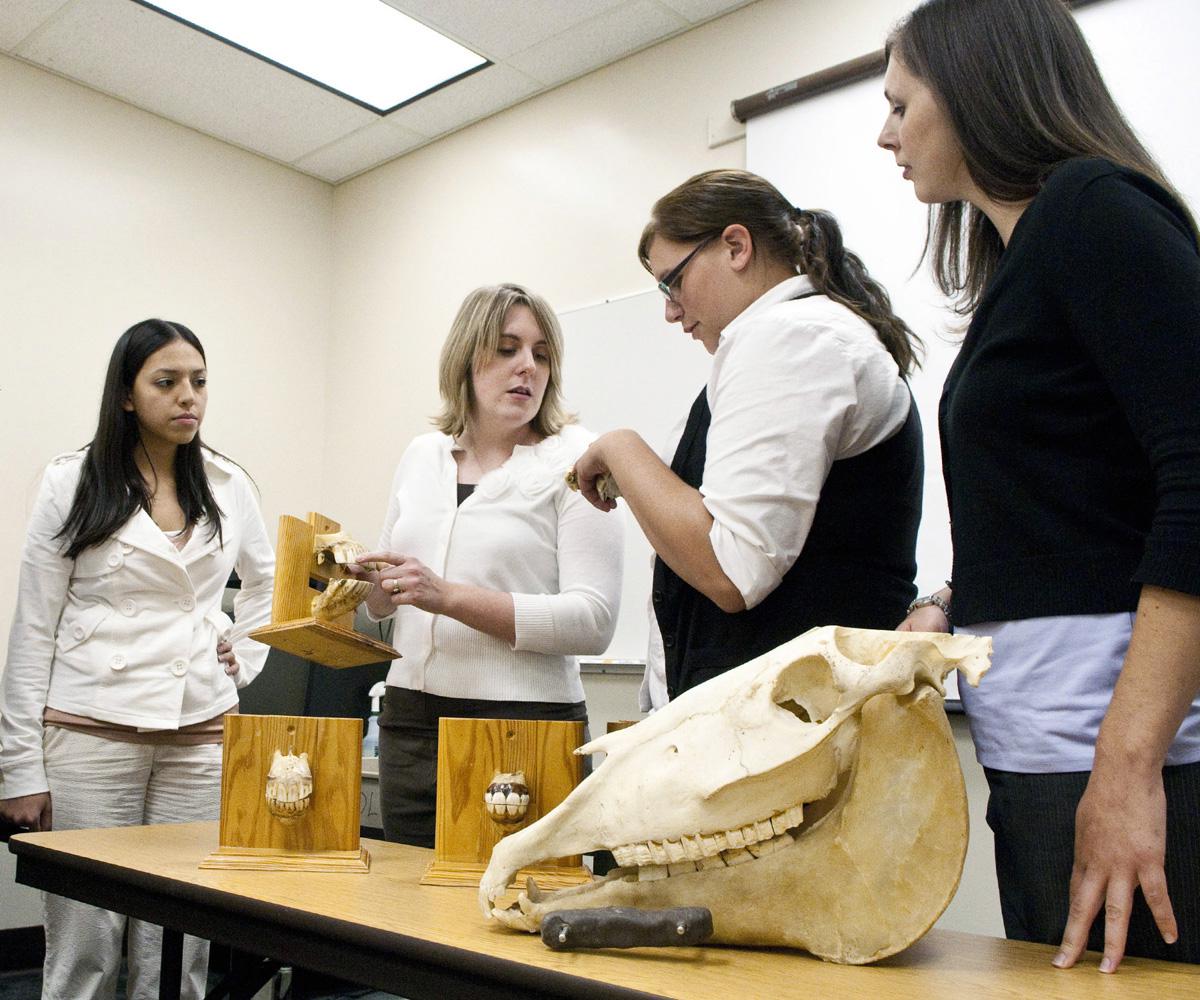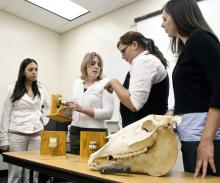Information Possibly Outdated
The information presented on this page was originally released on October 7, 2010. It may not be outdated, but please search our site for more current information. If you plan to quote or reference this information in a publication, please check with the Extension specialist or author before proceeding.
MSU vet tech program preps students for careers
By Karen Templeton
MSU Ag Communications
MISSISSIPPI STATE – Mississippi State University’s College of Veterinary Medicine’s new veterinary medical technology program is preparing students for a dynamic field full of career options.
Veterinary technicians, commonly called vet techs, provide technical support to veterinarians, researchers and other scientists. Vet techs perform procedures such as taking X-rays, assisting in physical exams, collecting patient history information, administering anesthesia, preparing animals for surgery, and managing and supervising nursing care.
Certified veterinary technicians are usually employed by private veterinary practices, universities, government agencies, humane societies, industry groups, biomedical research facilities, diagnostic laboratories, and zoo and wildlife facilities. The U.S. Bureau of Labor Statistics lists this career as No. 4 for employment potential through 2014.
“A credentialed vet tech is able to do everything except those procedures that veterinarians are required to do, such as diagnose problems, prescribe medication and perform surgery. They are great multitaskers and caregivers and an asset to the veterinary health care team,” said Dr. Regina Brotherton, director of CVM’s Veterinary Medical Technology Program. “Veterinary medicine is advancing rapidly, and the demand on veterinarians to provide optimal care is at an all-time high. Credentialed technicians can give veterinarians time to see more patients.”
Brotherton said CVM’s veterinary medical technology program provides students with the necessary tools to succeed in the evolving world of veterinary medicine. Prospective students must complete prerequisite courses to be eligible to apply to the competitive program.
There are 21 accredited veterinary technology bachelor degree programs in the country, and only three are at colleges of veterinary medicine.
Vet tech programs at veterinary colleges offer students the opportunity to complete clinical rotations with veterinary students.
“Working hand-in-hand to manage cases with vet students is a unique part of our program. The students in both programs can learn from each other,” Brotherton said. “Veterinary medicine students learn to perform spay and neuter surgeries in their second year, which provides the perfect opportunity for the veterinary technology students to become educated in pre- and postsurgery responsibilities, as well as inducing and monitoring anesthesia. Not only are they learning the technical aspects of their future careers, they are also learning how to collaborate effectively with veterinarians before they even enter a practice.”
The first CVM veterinary medical technology program class began courses this fall. Students must complete the 124-hour degree program and then pass a national exam to become certified veterinary technicians.
“We have a great class. They are all committed to the program and are keeping busy with the requirements,” Brotherton said. “They are getting experience working with everything from small animals and exotics to equine and food animals.”
Lindsey Turbyfill of Vina, Ala., had never heard of a vet tech program until this past year.
“I did not get accepted to vet school and was unsure what to do next,” Turbyfill said. “Dr. Brotherton found me at just the right time. She talked me into giving the vet tech program a try.”
Turbyfill is enjoying the program so much that she has decided to complete it before deciding whether to reapply to veterinary school or enter the workforce.
“I absolutely love the program; it is such a good fit for me,” she said. “It is definitely a challenge, as most days we are in class or the lab from 8 a.m. until 5 p.m. We are getting such great experience.”
Turbyfill also serves as the outreach coordinator for the program and is educating the public about National Veterinary Technician Week.
“The National Association of Veterinary Technicians set aside Oct. 10-16 to focus on educating the veterinary medicine community and the general public about the vet tech profession,” Turbyfill said. “The theme this year is ‘Hands-on Healing,’ and it focuses on the quality care vet techs provide to their patients.”
Brotherton said with help from Turbyfill and her classmates, they will continue to promote the program to prospective students and also motivate current students to prepare for future careers.
“Vet techs are such an integral part of the veterinary medical profession,” Brotherton said. “Students are amazed at the opportunities they have ahead of them.”
In recognition of National Veterinary Technician Week, the CVM technology students will host an event on Oct. 16 from 10 a.m. until noon at the dog park in Starkville’s Moncreif Park. The students will educate the community about their program and pet care, and provide fun activities for pets and their owners. The event is free and open to the public.
Contact: Dr. Regina Brotherton, (662) 325-7487




